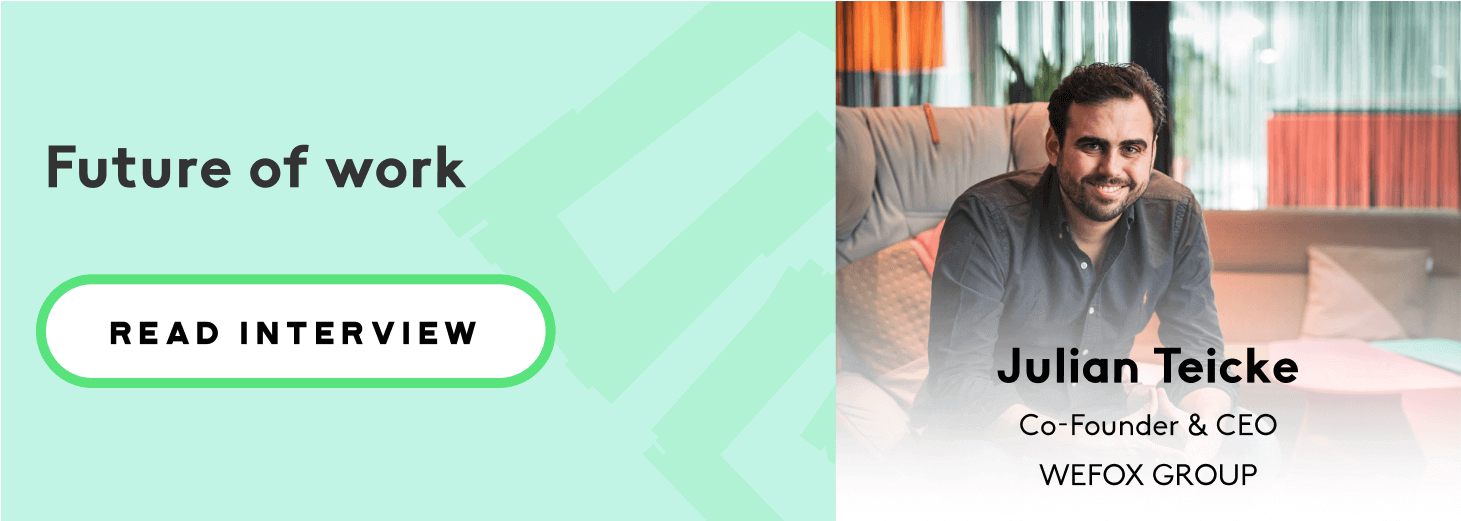If 2020 has taught us anything, it's that companies must prepare for the changes that are happening at breakneck speed. And that's why anything that helps companies become more agile prepares them for change and more importantly, to look after their employees is gaining more ground.
Remote working: a major job market trend
The Covid-19 pandemic has forced companies to implement obligatory teleworking, leading to a historic increase in this way of working in recent months. Before Covid-19, only 4.8% of Spanish employees worked from home. This has grown to 34% over the last few months.
This "new" way of working has been an enormous challenge for companies, especially human resources departments. Things like corporate culture, employee experience or recruitment methods are becoming more critical.
Today we talk to Antolín Romero, journalist and presenter of the Spanish programme “Aquí hay trabajo”, which offers information about workers’ rights, obligations, entrepreneurship and answers queries.
1. What can Spain do to attract the best talent for remote work?
I'm always more comfortable offering information than giving my opinion. There are already enough journalists who will tell you how things should be, they have an opinion about everything and how you should be doing things.
I believe that what we have to do in this situation is to facilitate and simplify things so that more people can start businesses remotely or work remotely or start a business and work onsite, without the remote element. We must always facilitate and simplify as much as possible, and I think this is where we're still a long way off achieving a reasonable goal.
2. How best to build a company culture when employees are working remotely?
I think companies have to work on clarifying exactly what their purpose is: a purpose that’s beyond the obvious, a purpose geared towards benefits for themselves and their employees.
Why do we do what we do? It doesn't necessarily mean wanting to save the universe. They could be objectives that are simpler, more achievable, more realistic, more about our company.
And I also think it's essential to transmit these objectives — not only the company's objectives but those of every employee. Working hours aren't necessarily that important, right? We don't necessarily have to work eight hours. We could work less if we fulfil our objectives because these objectives are crystal clear.
There's also another essential factor if a company wants to transmit its corporate culture. And it's going beyond the verbiage, beyond the statements that explain the objective, what this culture is...and PRACTICE what you preach. What better to transmit our ideas about goals than set an example for workers by demonstrating at an organisational level: through senior management and executives, proof that it really does happen in the company.
There's no better way to educate a child (and employees) than transmitting values through our own actions. Generally, leading by example is always best.
3. What is the current business culture in Spain?
I think that there are many companies with distinct cultures and that are on totally different levels. We recently discovered that in Mengibar, a town in Jaén, there's already a company running on a four-day week and is productive, profitable and is making this formula work.
Some companies are already there, looking after their employees because they know that, in turn, their people will look after the company. Others are still in prehistoric times and will only realise that something is wrong when they see the profit and loss statement. In my opinion, it's the profit and loss statement that puts all companies, and the workers, on the right track.
4. What changes will Spain’s Equal Pay Act bring?
I think it's great to have laws that rectify current imbalances, but I have more faith in laws that are more education-related because, ultimately, they tackle the problem at the root.
We must educate, not only in the business environment or university, but also in school and at home. Education is vital if we're really going to balance these inequalities. I believe they will diminish over time, but we still have, and there will be a lot of ground to cover.

5. What changes do you foresee in recruitment processes?
As I said earlier about companies, there are very different lanes travelling at very different speeds in human resources. In the programme "Aquí hay trabajo", that I present on channel 2, we receive comments from our followers telling us about questions they're asked during interviews, and it's embarrassing. In fact, many of our followers from the HR world tell us that they are embarrassed to have colleagues like that.
But, once again, some are moving much faster than others. We have to keep working on education and showing those who haven't yet realised it, that the human resources area is the one that ensures their company hires the best people. And the best are not the best because they're men or women, nor because they're 50 or 20 years old, that's not what this is all about. The best are the best, and human resources must find the best workers for their company, and that's the bottom line.
There is too much prejudice, and I think the first thing a human resources professional should do - and I'm sure that most of them do it, although some don't - is to familiarise themselves with the law and find out exactly what they can and can't ask.
And apart from the law - because you might not ask those questions and draw your own conclusions instead by looking at the candidate, regardless of whether the CV has a photo or not - you have to remember that the photo isn't that important, except for public-facing roles.
Human resources professionals shouldn't decide whether someone is right for the job or not based on a photo. If you believe that candidates are defined by their age, I think you need to re-examine your approach to this in human resources.
6. A personal reflection
In Spain, our job market is riddled with problems. Our unemployment figures do not match our immediate environment. These figures are among the worst in Europe, and we've got a lot of work to do. I'm convinced that we must do this work as a team: workers, companies, human resources, trade unions--we all have to reach an agreement because this is a win-win situation. We all benefit, we all have much to gain. There's a lot to do. There already was before the pandemic, and now there's even more, but as I always say, it's also an opportunity. As the saying goes: "out of crisis comes opportunity."
In my programme “Aquí hay trabajo” on La2, we’ve covered cases of business owners who’ve managed to overcome dire situations and make their business profitable by changing it completely. I’m not saying it’s easy, that it’s simply a case of wishing it and it’ll happen. No, it’s much more complicated than that, but it can be done and now’s the time to do it.
Our job market is in a mess, but it's up to us to try and fix it, and it can be fixed, for sure.
About Antolín Romero
In his Spanish programme “Aquí hay trabajo”, journalist and presenter Antolín Romero offers information about workers’ rights, obligations, entrepreneurship and answers queries.



